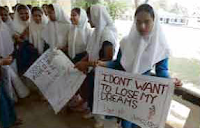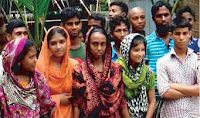* Look at the pictures and
discuss the following questions in pairs.
a. What does each of these photographs show?
b. What are some typical health problems affecting adolescent boys and
girls?
c. Who, do you think, are more vulnerable to adolescent health
problems-boys or girls? Why?
d. Why should all of us say 'No' to habit-forming drugs of every kind?
2. Now read about some typical
health problems experienced by adolescent girls and boys in Bangladesh.
i. Adolescents constitute a nation's core resource for national
renewal and growth. Adolescence is a period in life when transition from
childhood to adulthood takes place and behaviours and life styles are shaped.
According to the World Health Organisation (WHO), adolescence is the period
which shapes the future of girls' and boys' lives. There are 28 million
adolescents in Bangladesh; 13.7 million of them are girls and 14.3 million
boys.
ii. The situation of adolescent girls in Bangladesh is characterised
by inequality and subordination within the family and society. This inequality
leads to widespread practice of child marriage, marginalization in exclusion
from health, education and economic opportunities, and vulnerability to
violence and sexual abuse.
iii. In Bangladesh, the legal age of marriage is 18 for girls and 21
for boys. However, 33 percent of adolescent girls are married before the age of
15 and 60 percent become mothers by the age of 19. Research finds that
adolescents with higher level of education and from more affluent families tend
to marry at a later age. Boys, however, become ready for marriage only after
several years of adolescence and young adulthood.
iv. When a girl gets married, she usually drops out of school and
begins full-time work, in her in-laws' household. In the in-laws house, she is
marginalized. She becomes vulnerable to all forms of abuse, including
dowry-related violence. In Bangladesh, it is still common for a bride's family
to pay dowry, despite the practice being illegal. Dowry demands can also
continue after the wedding. For an adolescent bride, even if her in-laws are
supportive, there are greater health risks in terms of pregnancy and child
birth. The majority of adolescent brides and their families are uninformed or
insufficiently informed about reproductive health and contraception. The
maternal mortality rate for adolescents is double the national rate.
v. When adolescent girls are pulled out of school, either for marriage
or work, they often lose their mobility, their friends and social status. The
lack of mobility among adolescent girls also curtails their economic and
non-formal educational opportunities. Moreover, they lack information about
health issues. According to a study, only about three in five adolescents have
even heard of HIV. It is also reported that more than 50 percent of adolescent
girls are undernourished and suffer from anemia. Adolescent fertility is also
high in Bangladesh. The contribution of the adolescent fertility rate to the total
fertility rate increased from 20.3% in 1993 to 24.4% in 2007. Moreover,
neonatal mortality is another concern for younger mothers.
vi. While the situation for adolescent boys is somewhat better, many
are vulnerable and lack the power to make decisions about their own lives. Many
boys who are unable to go to school, or are unemployed, remain unaware of
social or health issues. They are at considerable risk of being drawn into
criminal activities. They are also more likely to get exposed to drugs and alcohol.
Sources:
1. Health Profile of
Adolescents and Youth in Bangladesh, Government of Bangladesh, 2007, available
at: http ^/bamsearo. who. m t/LinkFUcs/Publicati(»_Hcalft_Pro pd£
2. Unite for Children,
UNICEF, Adolescent Empowerment Project in Bangladesh, 2009, available at
http://www.unicef.org./bangladcsh/Adolcseent
Empowerment %28KA%29.pdf
3. Read the following
statements and decide if they are true or false. If a statement is false,
correct it.
a. In Bangladesh there are more adolescent boys than adolescent girls.
b. Many girls in Bangladesh get married before they reach the legal
age for marriage.
c. A bride's family has to pay dowry only before the wedding.
d. More than half of Bangladeshi adolescent girls cannot meet their
dietary needs.
e. Many adolescent boys in Bangladesh are likely to be involved in
various forms of criminal offence.
4. Column A of the following table lists some causes while Column B lists some
effects. Match the causes with the effects and join them to make sentences
using 'as', 'since' or 'because'.
Column A: Causes
|
Column B: Effects
|
I. Some adolescent girls have higher level of
education.
U. Boys are usually more concerned about their
financial independence.
iii. Many girls drop out of school after marriage.
Iv. Married girls have no status and bargaining power in
their in-laws' house.
v. Most adolescent brides have no or
little knowledge of reproductive health and contraception.
vi. Many
adolescent boys arc
unemployed and unaware of many social or health issues. |
a. This leads
to increased mortality
rates among adolescent brides during childbirth.
b. They have to
work all day long at
their in-laws' household.
c. They gel married several years after
adolescence and young adulthood.
d. They become
victims of domestic
violence.
e. They have a
tendency of getting
married at a later age.
f. They have
the risks of getting
involved in criminal activities, including drug abuse. |
5. Find out
the meanings of the words given below and make sentences with them:
a. dowry
b.
mobility
c contraception d.
undernourished
c.
vulnerable
6. The above text has six
paragraphs (i-vi). Choose the most suitable headings for the paragraphs from
the list of headings below. There are more headings in the box than the
paragraphs, so you will not use all of them.
List of headings
1. Reasons for adolescent fertility
2. Concerted efforts to address adolescents' needs
3. Significance of adolescent population
4. A process of disempowerment of women
5. The curse of early marriage
6. Consequences of taking drugs
7. Unfortunate state of adolescent girls
8. Boys are not free from risks
9. Violence within the family
If you want to read the next lesson of this unit please click the link below:
Lesson 3: Why Does a Child Hate School?









I need a summary fr this paragraph
ReplyDeleteHere is the summary of Adolescence
Delete